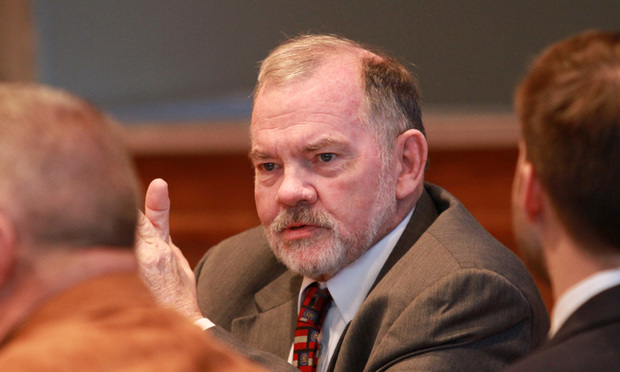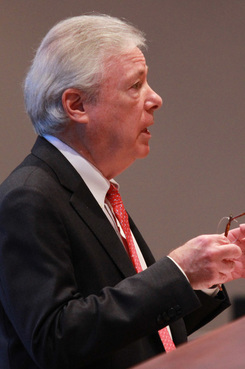Suspended Judge Takes Stand During Ethics Hearing on Allegedly Stolen Funds
Pike County Superior Court Judge Robert "Mack" Crawford is accused of taking $15,000 from the court's registry, money he claims he was owed by a former client.
February 25, 2019 at 03:34 PM
5 minute read
 Judge Robert “Mack” Crawford, Pike County Superior Court, during his JQC hearing on Feb. 25. (Photo: John Disney/ALM)
Judge Robert “Mack” Crawford, Pike County Superior Court, during his JQC hearing on Feb. 25. (Photo: John Disney/ALM)
Superior Court Judge Robert “Mack” Crawford's personal bank account was overdrawn by more than $2,000 when he told a court clerk to write him a check for more than $15,000 that had sat unclaimed in the court registry for more than 15 years.
But Crawford contended during testimony at his ethics hearing Monday that he had sufficient funds in other accounts that could have been transferred to cover any shortfall.
Crawford was the first witness to take the stand at a hearing by the state Judicial Qualifications Commission over whether Crawford violated the state Code of Judicial Conduct when he laid claim to the funds, which he deposited in 2002 on behalf of two former clients.
 Ben Easterlin, JQC executive director (Photo: John Disney/ALM)
Ben Easterlin, JQC executive director (Photo: John Disney/ALM)Crawford acknowledged that he paid the money back after Ben Easterlin, the commission's executive director, called him. Under questioning by Easterlin, who is prosecuting the ethics case, Crawford said, “You scared the hell out of me and asked me to give it [the money] back, and I tried to comply. And I thought we had an agreement that, if I paid it back, you told me this wouldn't go anywhere.”
Crawford said he did pay back $15,676. But the JQC filed ethics charges against Crawford last year and then suspended him from his post as a Pike County Superior Court judge after a county grand jury charged him with two felonies: theft and violating his oath of office.
If the JQC's three-person judicial panel, headed by Fulton County Superior Court Chief Judge Robert McBurney, finds Crawford violated the judicial ethics code, it could recommend his removal from the bench. Crawford was appointed to the bench in 2010.
Crawford, who is represented by former Georgia Gov. Roy Barnes and Zebulon lawyer Virgil Brown, contends that the money was owed to him by the client who hired him. That man, Dan Mike Clark, died in 2004. Crawford testified that he took the case without any fee agreement or retainer, which Barnes pointed out was not unusual for Crawford and “common outside the rarified air of King & Spalding and Alston & Bird.”
Easterlin is a former partner at King & Spalding.
Under questioning by Easterlin, Crawford claimed the Pike County Superior Court clerk had discussed the unclaimed funds with him several times and that he had given her possible contact information for relatives of his former clients. He said that, when the clerk informed him that she intended to forward the unclaimed funds to the state, Crawford said he had a claim on the money.
The underlying case challenged the tax sale of the property where Crawford's clients, Clark and Bobbie Whalen, lived. Crawford said Clark told him he could keep the money in the registry as a fee if he could keep Clark living on the property until he died.
Crawford said he fulfilled that promise.
Clark, he added, “could not pay me. … He was trying to come up with the money to put into the court.”
But Easterlin pointed out during questioning that the deposited funds would have been used to reimburse the buyer who purchased the property at a tax sale, if Crawford were successful. At the time, the property listed someone else as the owner. Crawford claimed that Clark told him he held power of attorney for property owner Ann Rita Thomas and that she had deeded the property to him, although the new deed wasn't filed until after the tax sale.
Crawford said that, when clerk Carolyn Williams notified him in 2017 that she intended to forward the unclaimed funds to the state, “She asked me if I wanted to take the money at one point. … She just wanted it gone. All she told me was she wanted it out [of the registry.] It had sat there for 15 years and still was in there.”
Clark said he never sought a court order from another judge to formalize the payment and advised Williams to not file his handwritten note in the old case file. Crawford said he wrote the note, “so if somebody came behind us, there would be a record of it.”
“It was never filed under the case number, because it was closed,” Crawford said. The judge also acknowledged that he didn't sign or date his note.
“I made a mistake,” Crawford said. “I am humbly sorry that I took it.”
Crawford said he learned after the GBI began investigating that agents located Whalen and that she claimed the funds after he returned the money to the court.
This content has been archived. It is available through our partners, LexisNexis® and Bloomberg Law.
To view this content, please continue to their sites.
Not a Lexis Subscriber?
Subscribe Now
Not a Bloomberg Law Subscriber?
Subscribe Now
NOT FOR REPRINT
© 2025 ALM Global, LLC, All Rights Reserved. Request academic re-use from www.copyright.com. All other uses, submit a request to [email protected]. For more information visit Asset & Logo Licensing.
You Might Like
View All
Carrier Legal Chief Departs for GC Post at Defense Giant Lockheed Martin

A Looming Seismic Shift in the Rules of Evidence: The Far-Reaching Impact of Diaz v. United States
9 minute read
Mike Lynch's Brush With Prison Taught Him Life Is Precious. Then a Yacht Accident Proved Him Right

How Defense Attorneys Can Prepare for the Possibility of a Nuclear Verdict
6 minute readTrending Stories
- 1DeepSeek Isn’t Yet Impacting Legal Tech Development. But That Could Soon Change.
- 2'Landmark' New York Commission Set to Study Overburdened, Under-Resourced Family Courts
- 3Wave of Commercial Real Estate Refinance Could Drown Property Owners
- 4Redeveloping Real Estate After Natural Disasters: Challenges, Strategies and Opportunities
- 5Calif. Fires Should Serve as a Reminder to Fla.’s Commercial Landlords and Tenants Not to Be Complacent
Who Got The Work
J. Brugh Lower of Gibbons has entered an appearance for industrial equipment supplier Devco Corporation in a pending trademark infringement lawsuit. The suit, accusing the defendant of selling knock-off Graco products, was filed Dec. 18 in New Jersey District Court by Rivkin Radler on behalf of Graco Inc. and Graco Minnesota. The case, assigned to U.S. District Judge Zahid N. Quraishi, is 3:24-cv-11294, Graco Inc. et al v. Devco Corporation.
Who Got The Work
Rebecca Maller-Stein and Kent A. Yalowitz of Arnold & Porter Kaye Scholer have entered their appearances for Hanaco Venture Capital and its executives, Lior Prosor and David Frankel, in a pending securities lawsuit. The action, filed on Dec. 24 in New York Southern District Court by Zell, Aron & Co. on behalf of Goldeneye Advisors, accuses the defendants of negligently and fraudulently managing the plaintiff's $1 million investment. The case, assigned to U.S. District Judge Vernon S. Broderick, is 1:24-cv-09918, Goldeneye Advisors, LLC v. Hanaco Venture Capital, Ltd. et al.
Who Got The Work
Attorneys from A&O Shearman has stepped in as defense counsel for Toronto-Dominion Bank and other defendants in a pending securities class action. The suit, filed Dec. 11 in New York Southern District Court by Bleichmar Fonti & Auld, accuses the defendants of concealing the bank's 'pervasive' deficiencies in regards to its compliance with the Bank Secrecy Act and the quality of its anti-money laundering controls. The case, assigned to U.S. District Judge Arun Subramanian, is 1:24-cv-09445, Gonzalez v. The Toronto-Dominion Bank et al.
Who Got The Work
Crown Castle International, a Pennsylvania company providing shared communications infrastructure, has turned to Luke D. Wolf of Gordon Rees Scully Mansukhani to fend off a pending breach-of-contract lawsuit. The court action, filed Nov. 25 in Michigan Eastern District Court by Hooper Hathaway PC on behalf of The Town Residences LLC, accuses Crown Castle of failing to transfer approximately $30,000 in utility payments from T-Mobile in breach of a roof-top lease and assignment agreement. The case, assigned to U.S. District Judge Susan K. Declercq, is 2:24-cv-13131, The Town Residences LLC v. T-Mobile US, Inc. et al.
Who Got The Work
Wilfred P. Coronato and Daniel M. Schwartz of McCarter & English have stepped in as defense counsel to Electrolux Home Products Inc. in a pending product liability lawsuit. The court action, filed Nov. 26 in New York Eastern District Court by Poulos Lopiccolo PC and Nagel Rice LLP on behalf of David Stern, alleges that the defendant's refrigerators’ drawers and shelving repeatedly break and fall apart within months after purchase. The case, assigned to U.S. District Judge Joan M. Azrack, is 2:24-cv-08204, Stern v. Electrolux Home Products, Inc.
Featured Firms
Law Offices of Gary Martin Hays & Associates, P.C.
(470) 294-1674
Law Offices of Mark E. Salomone
(857) 444-6468
Smith & Hassler
(713) 739-1250






